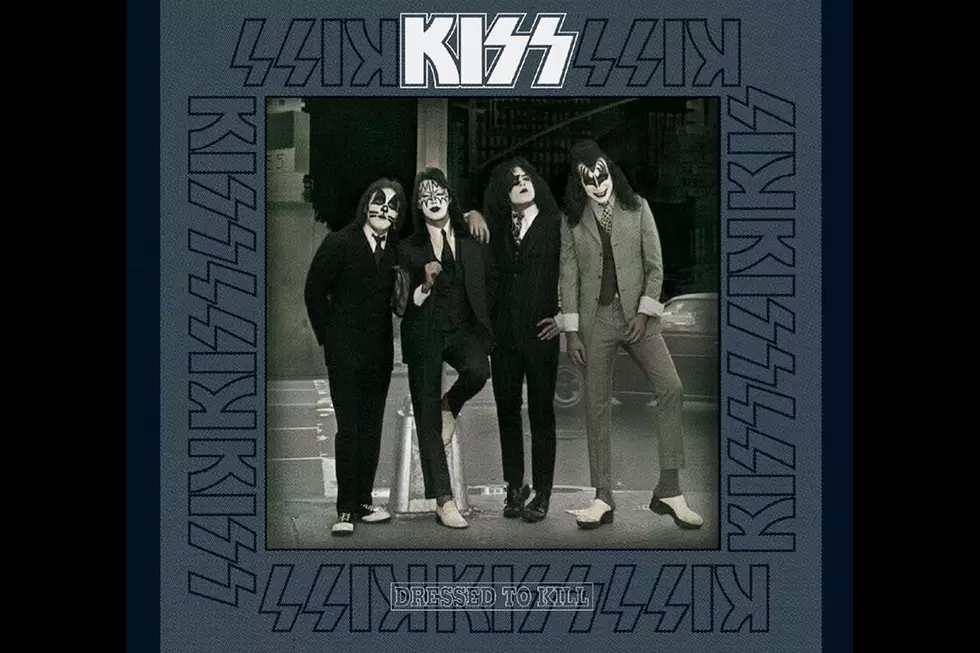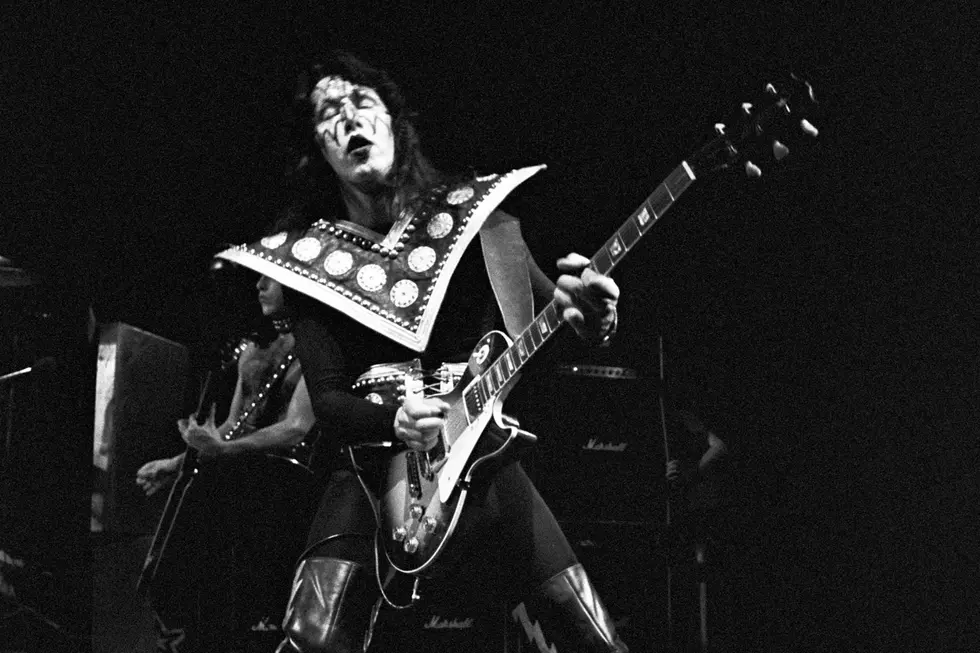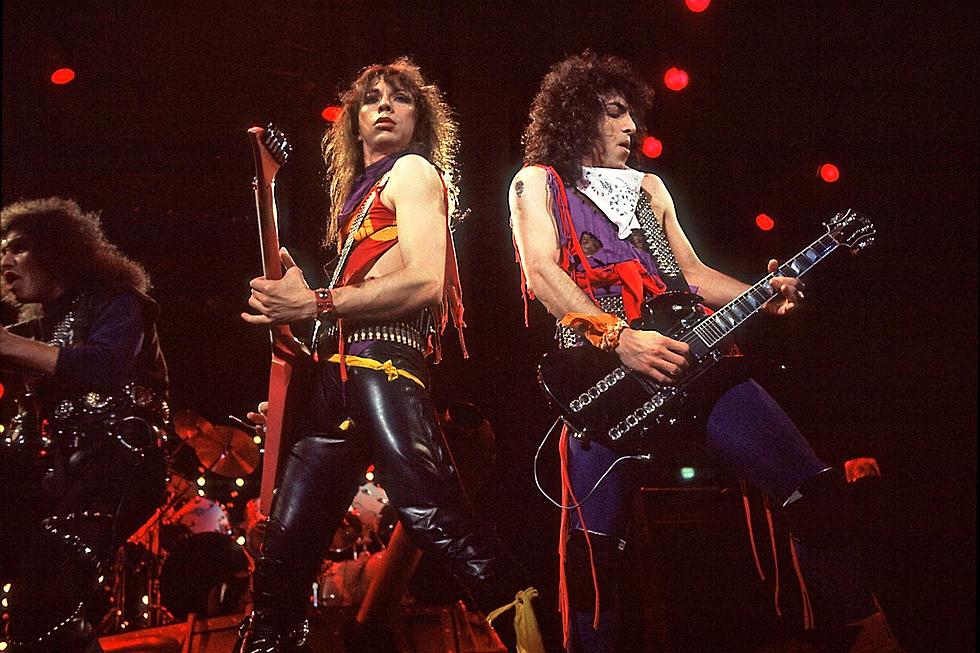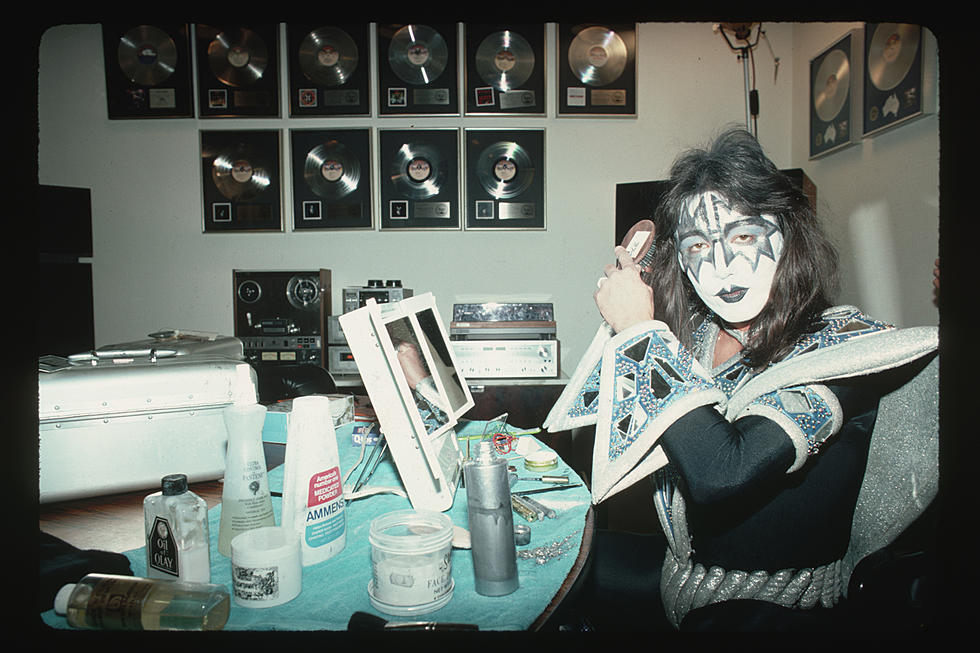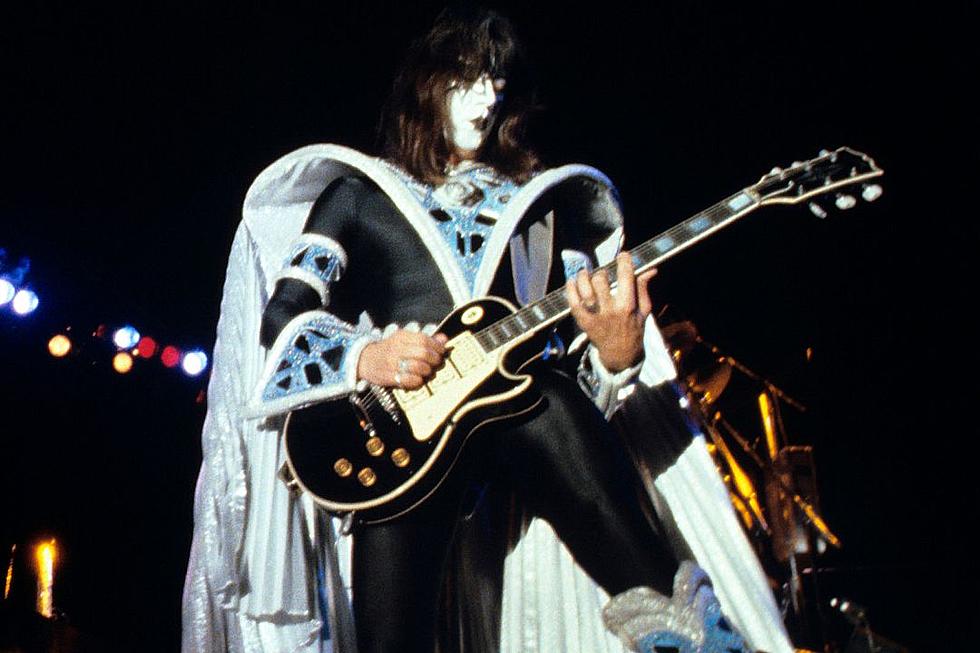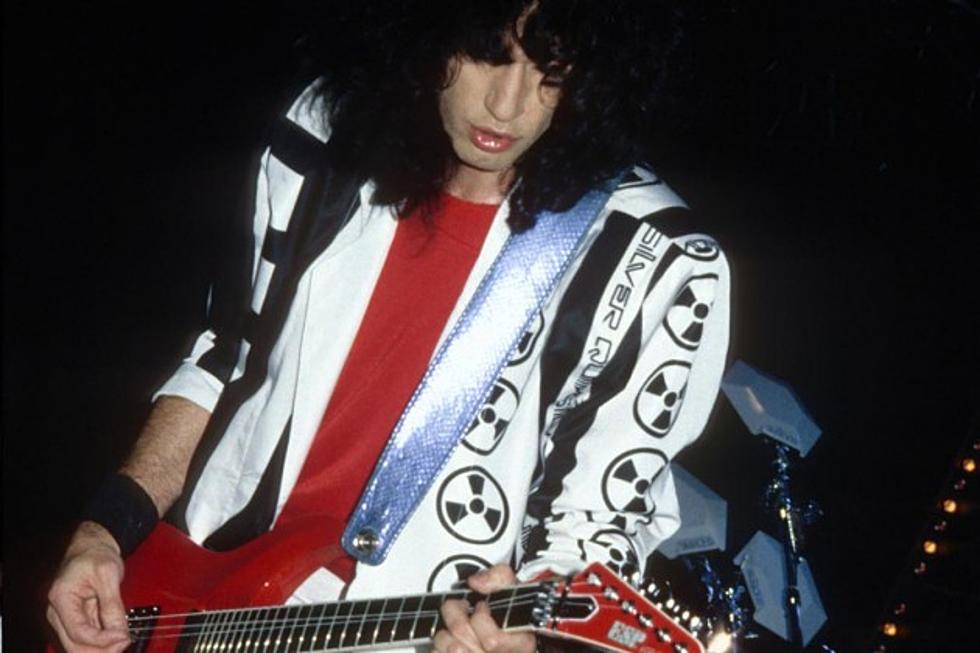
Bruce Kulick Looks Back on His 12 Years in Kiss – Exclusive Interview
Yesterday, in part one of our exclusive interview with Bruce Kulick, the guitarist explained how he was invited to temporarily join Kiss back in 1984. It was a chaotic time for the group, who were enjoying their biggest hit in years -- 'Heaven's on Fire' -- but also facing the prospect of changing lead guitarists for the third time in as many years.
Today, Bruce talks about what happened when that gig became permanent, and how his past experiences prepared him for the 12 years of live and studio work he did with the group:
Looking back, how well-prepared were you for this gig? Certainly you had done other things. You had toured with Meat Loaf, for example. It wasn’t like it is for some people that haven’t done anything so they don’t know what they’re walking into.
All of that experience I had, especially the arena touring with Meat Loaf and I had done other gigs where I played some very large venues with some of those disco artists. Some of the gigs with Michael Bolton, both solo and with the band Blackjack we had -- we got to open for Bob Seger and Peter Frampton on the road, for example, through those years. Those were very important, because I got the feel of what it is to be on a big stage, you know, you're on, you don't have a lot of time. That's the trial by fire where you really learn what it is.
With Meat Loaf, that tour just went on and on, we struggled at first and then the record hit and then we're selling out arenas and traveling around the world. So I really do feel that that helped, although, with Kiss, you gotta remember, in all those other roles, with Michael Bolton I was his lead guitar player kind of like his Mick Ralphs of Bad Company and that kind of a thing because we were a blues-based rock band, but this is Kiss.
You're going to have Gene [Simmons] and Paul [Stanley] -- it doesn’t matter that they’re not in makeup --they command the stage. They literally do not stop moving. And I don't think Paul minds if his chords are a little off if he's entertaining the crowd in a major way, which he always does. So it's a completely different animal, trying to fit in with the kind of gymnastics of their approach on stage. I had to work my way around that. But the idea of flying over to England and sound checking and doing the gig and all the things involved with a tour, all that, obviously I understood well, so that was the comfort zone.
I can't even imagine what that would be like for someone who had only played clubs or something like that and all of the sudden they're thrown into Kiss. That would have been really hard for someone. So I'm really happy that I had the other experience, but I still needed to adjust and fit in with something that was extremely unique and nothing like anything I played in before. There aren't many bands like the way Gene and Paul perform, we all know that.
Certainly you probably saw fans out there that were pro-Ace [Frehley] and not so much for the new guy. Did the shadow of Ace sit in the back of your mind when you were coming into that?
Well I was kind of relieved that there was another guy, and almost another guy before me. So I didn't have to walk in like Vinnie [Vincent]. Even though the band evolved with the music, you know, there was that period, where yeah, they might have recorded, [but] like, I think ‘The Elder,’ it was already kind of falling apart and who knows how much Ace is on that. And then ‘Creatures’ was the next record, right? They realized they had to go back to more rock and roll, right? And by then they were using a lot of session guys, and then of course they realized Vinnie might work out and then they went with Vinnie and they did ‘Lick it Up.’
So there was that buffer of a couple other switches there. Mark [St. John] of course did the majority of ‘Animalize’ and Ace's shadow was always there, because it's Ace. But the band took the makeup off and the pressure wasn't as strong as maybe Tommy [Thayer] would feel. Because clearly, [he] walked into the lead guitar of Ace, but the outfit too, and the make-up. For me, it was more of a general sense of pressure of what it is to be the lead guitar player of Kiss, not so much "Oh, Ace came before me."
I mean, you can't ignore the history and the iconic nature of Ace's fingerprint upon what Kiss is about. And it's still a strong footnote to what it's all about, we all know that so that's where there's lots of mudslinging between them all. It makes for good press for you guys -- and I stay out of all that nonsense, because you know, I like to focus on the good stuff. My era is not too controversial anyway, it's more an interesting evolution of albums and tours and great memories for many, many fans.
But it was more the pressure of being the lead guitar player of Kiss -- a band with a brand name that is known around the world and not so much that like "I'm the new Ace Frehley" And you know how hard it was when I was gigging there was no big announcement until during the tour, then it takes two months for the magazines to get it out there anyway - "The New Guitar Player Bruce!"
I was barely in the tour book because they had already shot that with Mark, they finally switched it over and put me in some of the copies. It was a mess. There was no major announcement. Of course by the time we got ready to go into the studio to do ‘Asylum’ everybody knew that it wasn't Ace, it wasn't Vinnie and it wasn't Mark St. John, okay? I think people came to gigs during the ‘Animalize’ tour and they didn't know who the guitar player was. They really didn't know.
I had a friend that saw you on that tour, prior to you being officially in the band, and he remember Paul referred to you as “Mr. Mystery Man” or something like that.
Yeah, yeah, I was just reading some of that recently. That's kind of clever, too, on his part because he probably realized, does it make them look odd that they didn't make an announcement? But I don't think they were committed yet. You know what I mean? And even if they were, probably by the time I signed the contract, maybe he gave me a name. I didn't have a solo on [the] ‘Animalize’ [tour] but I wasn't really ready for that. I was just there to play guitar you know?
So what's the moment? How did you find out that you officially had the gig?
It was during that ‘Animalize’ U.S. tour where they let Mark do an entire show and they were miserable. They knew they had to send him home. That was the night I got the phone call -- of course I didn't sign the contract that night -- it took a little while to get the paperwork and take care of business.
I remember the contract was dated Dec. 7, so it had to happen somewhere towards the end of November into the first week of December. But it was basically that phone call where I told you earlier where Paul was like, "We really want you to be the lead guitarist and we want you to be competitive and we want you to play great. Don't be afraid of any style. Just give it your all." And that was a great pep talk from Paul -- it really meant a lot to me, I still remember it really clearly, it was on a hotel phone. There were no cell phones 30 years ago.
With the contract you signed, was there anything in there that stuck out as a pretty unique stipulation compared to things you'd seen before or since then?
Not really. You gotta remember, that Kiss needed in their contracts to always protect what they learned from when other band members you know, had to depart. Like I said earlier, there was a lot of legalese in it, but there was nothing in there that surprised me at all. You gotta remember, it's not like Gene and Paul write these things, a real attorney does the music business and hopefully [it was] probably someone that had worked with them for a while and knew what the brand name meant. It's funny, I'm missing one page that I'm sure I shared with my attorney at the time.
And it’s the one page that I could tell, there's probably some good stuff in there to read, but I don't know where it is and I don't even remember what attorney I had back in 1984, I really don't. But I remember any of the points that I wanted to be clearer about was all done with a separate piece of paper with Gene's signature on it. And it just had to do with songs that they weren't going to record and weren't going to use because the contract made it seem like a little overly ambitious that way.
But you know, with any contract that you're offered, you need to make a point, take what you get and what you see in it and then go, “Well, what about this?” and just kind of lay that out there and that wasn't their intention. That was the one I really enjoyed reading because it was written more like I could have typed it up. And usually those are the important parts that really mean something to you.
Everything else is like, if it said, "You need to behave in a respectful manner and not be abusive with drugs" or whatever, you know, even that's all written legally. It's kind of crazy when you think about it. And then you realize how contracts sometimes, wouldn't it be easier if we just did a handshake and everyone could trust each other, you know what I'm saying? But like I said, I was proud to read that extra addendum page, because I know that that was something I could recognize on my own and it was basically presented like as if I typed it up.
It wasn't your standard contract stuff, and of course I was grateful that they agreed to all that because that wasn't their intention in the contract to begin with. But that's what lawyers are for, really to point out to you that, “You know, this really can mean this too, I don't know if they mean that. You need them to make sure." You know, everything’s just the language of it. I mean, how many times have you misunderstood a text from somebody?
And they meant, possibly, the opposite of what they wrote, because when you take it out of context you don't know. So when someone sends me legal contract stuff, my lawyer, a dear friend of mine, he always shows me how, you know, you put one word in there and it suddenly protects something they didn't mean to put in there. But if you didn't put that in there, then you're not protected when this happens. And that's why those guys work, especially in the music industry.
What's the scene when you go in to work on your first official album with the group, the album that would become ‘Asylum.’ What was that like?
Well first of all, now it's like, I'm living on cloud nine. I'm a band member, we're writing, we were recording four co-writes of mine. I think it might have been two [with] Gene and two [with] Paul, I'm not positive right now. That was very exciting for me. I mentioned Jimi Hendrix earlier and we're recording at Electric Ladyland, I mean, come on! Wow! The Swedish press are coming in to cover us.
The local magazines -- Hit Parader, Circus, whatever, they're coming by for a visit. We're hanging out on Eighth Street, I'm seeing the other New York people that were famous back then. It was very exciting. I worked my ass off. I remember that sometimes if it was a Gene song, of course Gene was there, but if it was a Paul song and vice-versa, maybe the other one isn’t there -- but I remember doing 30 days in a row in the studio. I didn't mind. I loved it. But the point is, that's a lot of work. That's hard work. But there I am, living the dream. Lead guitar player for Kiss, and we’re recording an album at Electric Ladyland. It was amazing.
And from the demos I've seen floating around, it seems like there was a good amount of material in the pool for that record.
You know, I'm starting to dig through the original cassettes. Paul is not the kind of guy to write a lot more than what was recorded. ‘Crazy Nights,’ yes -- he wrote a few more which wound up on the box set and stuff like that. Gene just has a backlog that he could put out a quadruple box set right now of songs that were never recorded. I’m not sure you'd want to listen to more than one side of them, but I'm just saying, he just would write a lot. I don’t really remember ‘Asylum’ necessarily having that much extra stuff, but we'll have to do another interview about that. It came out in ‘85 right?
Yep!
So 2015 will be the 30th anniversary of the release of "Asylum."
In the studio, especially with that first record, how much freedom was there as far as your solos and what you did with those?
That's a great question because my job was like, you know that really incredible dog that some family always wanted, but that dog's kind of struggled his whole puppy life and now he can be with a really good family that will keep him active and busy? I was that dog. I was just there to make them happy. I was thrilled because it was a career dream to be in Kiss so for me, what do you want me to play? What do you want me to work on?
It was less about me exerting my particular point of view and more about working with them to help them create the vision that they had in their mind. I knew they worked that way with many guitar players, sometimes very successfully -- with my brother too. Obviously he wouldn't be on the songs that he performed on with Kiss [otherwise].
Some of the songs are terrific, like ‘Larger Than Life’ and ‘All American Man,’ but honestly, I know when Bob went in there during ‘Creatures’ and he had a bit of a "I really think this is good" [attitude] They didn't like that -- I knew that. They didn't use anything that he did the time that he went in to to play guitar for them. I think the approach for working with those guys was totally to make them happy. What would you like? Look, they're talented and smart enough not to take an attitude slopfest of a solo. So, you're not going to in any way compromise your career by taking direction from them. Both of them definitely knew the difference between a strong guitar lead and a horrible one.
I talked about Ace's influences, but I gotta be clear that Gene and Paul loved the same guitar players that I do -- exactly the same -- the Hendrixes, the [Eric] Claptons, the Jimmy Pages and all of that. So it wasn't really hard to please them, of course, we were getting into that territory where flashy guitar playing was real important, because you had all these guys, which Eddie [Van Halen] started, that can play flashy like George Lynch in Dokken and the Ratt guitar player Warren DeMartini, really playing those high-powered Strat things with the Floyd Rose [tremolo] and playing fancy, so I was doing a lot of that too.
You know, particularly on that album I love ‘Tears Are Falling’ because Paul and I really worked out a whole melodic thing and I was able to throw in a riff that is complicated to play, but totally influenced by another band I haven't mentioned. But you know, I listened to Yes a lot when I was young. I loved Steve Howe, who is very different than Eric Clapton, but a very creative guitar player. I still love Yes. I'm going to be putting out in 2015 a band that I had from 40 years ago and we just cut a new song. I would say that we were a cross between like a kind of Cream and Yes because there's a lot of sections that are very progressive.
It's not vocally similar to Yes. But it's very creatively put together where all the instruments react in a unique way. [They were a] big influence for me. So it was really cool when I could contribute something that was not Van Halen, something more like, "Whoa, I'm going to throw that riff in there because I can play that and I stole it from someone that's a little left of rock and roll." You know what I mean? From a progressive band. So, I was just there to make them happy and I'm glad I did.
When you look back at your 12 years, what are the songs and albums that you're really proud of?
It's a very fair question, because the fans that don't know me don't realize how many albums I was involved in with Kiss. I mentioned ‘Tears Are Falling’ already, people love ‘King of the Mountain’ that was kind of really creative, you know, Paul having me follow the drum parts and ‘Fight Hell to Hold You,’ even though I just wrote that big, climbing, exciting riff and some verse chords, but it still felt very important to me. But as you go down the line of the albums like ‘Crazy Nights’ and you have stuff like ‘No, No, No.’ You know, each album has got some songs that I felt like I kind of made something unique on that a lot of fans will ask for or yell out if I'm doing a gig. ‘Hot in the Shade’ had quite a few, including ‘Forever’ of course, that's the other side of me with the acoustic. That I was very proud of.
I just did a rewind with ‘Hot in the Shade’ and I know you guys covered some of that. You know, I actually enjoyed the record much better recently, than I did the years after it. I thought it was too many songs [at that time], you know what I mean? I had a whole new fresh take on it, really listening to it, and it sounded a lot better than I remembered. I doubt the new vinyl reissue sounds very good though because even though I own it, I didn't play it. They had to cram 30 minutes into each side and that's not good for vinyl. That's not going to make it sound good.
And then certainly by the time we got to ‘Revenge’ you have terrific songs, from ‘Domino’ to ‘Unholy.’ The song I wrote called "Tough Love," "God Gave Rock and Roll To You II," that's the other anthem to me, that I think even though it's a cover song, they made it their own.
They changed some of the lyrics and the approach that we had with [Bob] Ezrin was really really special. I'm proud of ‘Alive III’ and ‘Unplugged,’ I'm very proud of. That was really us naked and especially before Ace and Peter [Criss] came out I thought it was so tight and we were really showing that we can do it without the lasers and big amps and everything and we can still go entertain everybody. Paul's was singing incredibly on that. So there's so many highlights through the years to be honest there really are. It's something to be proud of.
Having done that ‘Unplugged’ thing, you probably understand better than a lot of folks about that controversy this year as far as who was going to play at the induction ceremonies.
Yeah, I certainly would have loved something like that to have been presented, but apparently, once the Hall of Fame laid down the gauntlet like "No, we want you in makeup," that was it. That was a non-starter. There you go. MTV didn't expect that. They didn't ask anybody to come out in makeup. I mean, part of the MTV deal was we're going to do ‘MTV Unplugged,’ but Ace and Peter have to make an appearance, because they were pushing for that. Because it was time.
So you understand how MTV was like a catalyst to the reunion tour. But it was the right timing. Alex Coletti was the main guy behind MTV, and he was a huge Kiss fan -- he knew what buttons he was pushing, but it was time. We were running around the country with the convention tour, dragging around mannequins with outfits on them.
Doesn’t that kind of show them, well, maybe now is the time, before those guys get too impossible? Which of course they did after a time anyway. I mean how long could Ace handle it? Four years? And Peter in and out for three or four years. You know there's no way those guys could be doing what Eric [Singer] and Tommy are doing for Gene and Paul. There's just no way.
I mean, I know Ace is touring and the fans are happy and he just put out a new record which is cool. Peter says there's something new coming and that's cool. But for them to be the way Kiss is now with the energy and talent of Eric and Tommy, I just know that that will never happen again with those guys. Never.
You Think You Know Kiss?
See The Yearbook Photos of Bruce Kulick and Other Rock Stars
More From Ultimate Classic Rock
